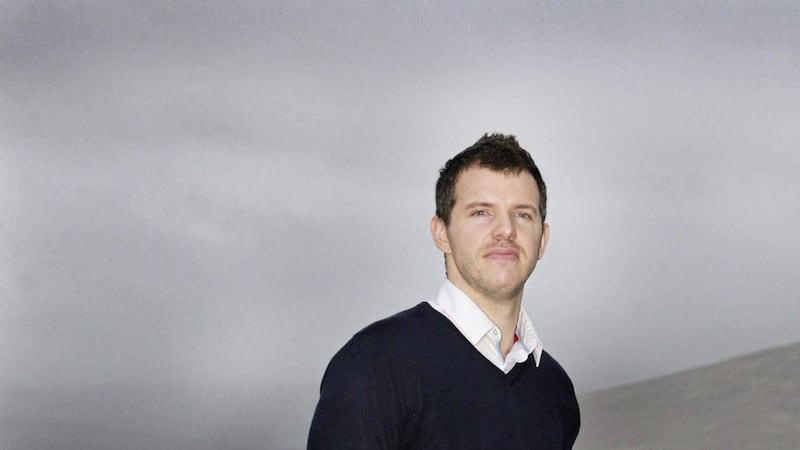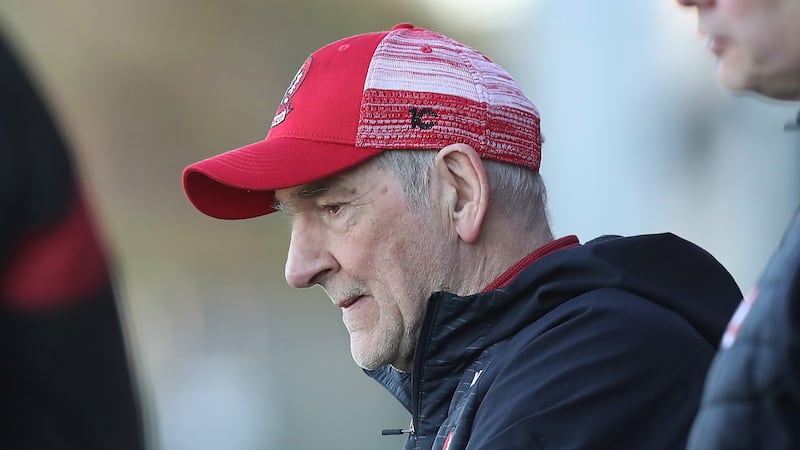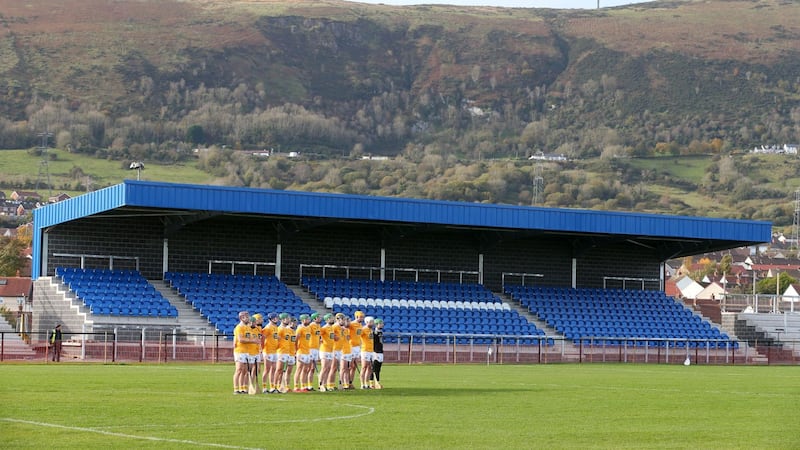IF you had a say in how sport was to end for you, would you want to go out at the very peak of your powers, or would you rather play until someone locked you on the other side of the changing room door?
Some are fortunate enough to be able to choose themselves. PJ McCloskey wasn’t, but at least he has the solace of knowing that his last game in a Derry jersey was his best, and it’s how he’ll always be remembered.
When Down came to Celtic Park in July 2013, they’d won there just a month previous thanks largely to the dominance of their midfield. They stood Kalum King, Ambrose Rogers and the majestic Kevin McKernan in a line and Derry could find no way past. 32 of the game’s 35 scores came from play and in hitting 2-17, Down did enough to win.
McCloskey was a caged tiger that day. Having played the whole of the regular National League campaign, a knock ruled him out of the final against Westmeath and the championship opener.
It was the story of his career in a way. An ankle reconstruction turned him back from the doors of a breakthrough during Damian Cassidy’s time. An appendectomy followed in 2010, and then a laparotomy on his stomach the following year because of a burst kidney.
Just as Brian McIver took over in the autumn of 2012, McCloskey was proving his credentials. He was the best club midfielder in Derry that year as he and Mark Lynch dragged Banagher to within a whisker of a place in the county final.
When he answered McIver’s call and joined the county setup he was 28, on the very precipice of his footballing and physical peaks.
With Fergal Doherty also absent, he stood out through the National League and was already considered a notable absentee by the time Down first rolled into Celtic Park.
When they returned for a qualifier a month later, McCloskey was no longer caged. He and Patsy Bradley took complete command of the middle third that afternoon. McCloskey fetched ball after ball for an hour.
And then in an instant, it was all over, even if he didn’t know it was for almost two full years after.
“It was the last 10 minutes. I was in a tackle with Kalum King. I still mind it; I was trying to shrug him off.
“That day, I was going so well I thought I could do that to a 17-stone man. It turned out I couldn’t quite get it done.
“I remember the knee twisting as I was trying to shrug him off. I felt a bit of a crunch, but not a pop like other boys would say.
“I got up to play on and maybe only got the ball once more after that.
“I walked off and thought I was alright, there was nothing to worry about. But the knee swole up right away.
“I think I spoke to yourself and a few reporters coming out of the changing room. I didn’t know then what I’d done, but I had ice on it.
“I had the MRI the following week. It was a case that it wasn’t a 100 per cent clean cruciate snap, but it was a tear that wasn’t functional. [Renowned surgeon] Chris Connolly decided to operate on it. That was it.”
That was literally it. Since that day, he hasn’t had a Derry jersey on his back again. He’ll be 33 in April and knows that the ship has long been out at sea.
The frustration is that he was struck down just as he was realising the potential that he had.
“I’d spent 15 years getting to that point, and there was maybe another four years to come of that. I’d set my life up in a way that allowed me to do that.
“I had the right job, the right routine, the right support around me. I’d broken into the team. As far as I’m concerned, that’s a lifetime to get to that level.
“To realise what you have to do, to know how to do it, to start doing it, to set everything else up in your life around it, that three or four years was my window.
“I knew when I hit 30, I’d been out of it for so long I couldn’t get back.”
He would remain on the Derry squad until right before the 2015 championship but was never fit to kick leather in his county colours again.
The first seven months of rehab went according to plan but it was only when he stepped out of the gym and back on grass that the problems started to manifest.
McCloskey attended the Ulster Championship launch in April 2014 and at that stage, ruled himself out of the provincial championship but hoped to be involved beyond that.
As it turned out, he wouldn’t play any football at all until the club championship of the following year.
“It never came good for me. Chris put stitches in my meniscus.
“They’d come loose, and that’s why I was still getting pain in the knee. Usually they would cut the meniscus away but he thought he could keep mine and it’d be alright. They eventually had to operate again and take the stitches away.
“That was month eight or nine, February or March 2014, and it was only then that I realised I needed another five months.
“It was putting me back a good bit. After that, I don’t know if it was because I had a second operation or because the meniscus got taken away – it’s the bit that gives you cushioning – but even in months 14, 15, 16, 17, I couldn’t put back-to-back sessions together.
“I couldn’t train twice a week. I couldn’t do once a week without being in pain for four days after. Without being able to train I was trying to play, and you weren’t fit.
“I knew my knee wouldn’t come through a game. The knee might feel alright during it but you’d end up out for a week or two after it.”
*
HE finally made his return to football in a drawn club championship game against Glenullin late in 2015, off the bench for the last two minutes.
The last 15 was his lot in the replay, before he finally started and played a full 80 minutes in an extra-time epic against Ballinascreen.
But when Banagher went out to face Coleraine in the quarter-final, he had to sit it out. And since then, he hasn’t played a game of club football either.
There's a good chance now that he will never play again. He sits the day before New Year’s Eve facing inward on the living room at his parents’ house, with the glorious green valley between Feeny and Claudy sprawling across the landscape at his back.
His right foot is in a protective boot, which he’s only had removed over the last fortnight. He remains on crutches and will do for at least a few weeks yet.
It’s more than six months since he suffered a broken leg in a club hurling game on an apocalyptic Friday night in Ballinascreen. The black sky overhead gave him a bad sense before a ball was pucked.
He would leave Dean McGlinchey Park in an ambulance, having lay on the top pitch for 40 minutes before an ambulance arrived, and then for another while receiving gas and air.
“Mark Lynch and Sean McCullagh lifted me into the ambulance with the ambulance staff. My sister Maria was there and she came in the ambulance with me.
“I remember the ambulance driver talking about Gary Stevenson, saying she knew him because he took her for fitness classes in Maghera.
“She joked to me when we got there ‘you bled the whole way in and ruined my good ambulance’. I said: ‘Jesus if I’d known you had cleaned your ambulance today, I wouldn’t have broken my leg, I’m really sorry.’”
McCloskey was in Altnagelvin for two nights, getting the compound wound stitched on the Friday before putting him in a cast from foot to hip.
“That was painful to be fair, when they were lifting my leg.”
He went to theatre early the following day and expected to awaken from anaesthetic with the operation complete.
But when he came around, surgeons informed him they’d decided on a different course of action.
“The orthopaedic surgeon took me in to see what he’d do. He assessed my leg while I was out and they said they’d leave it a while at least.
“He explained to me the next day that he’d cleaned me out and assessed the alignment, and he was happy to leave it, but he said he’d monitor it.
“He said if I recover fully I’d be fine, but if I don’t he can operate then. That might mean breaking it again to fix it, but he said sometimes less is more. It was a 50-50 call.”
Less might be more. It might not.
For now the protective boot is off, and an operation doesn’t look any closer unless he goes on to develop an issue with mobility.
Just weeks before the leg break he had opted to move out of his full-time just as a utility regulator and into freelance work in London, where he’s been based for most of the last two years.
He remains on crutches but is back to work, having relied on his savings and the goodness of his club Banagher, who held a fundraiser to help him through.
The yearning now is to try and repay his club. By his own admission, between injuries and work, he hasn’t been able to give as much back to the club as he would have liked. And there’s even the recognition that Derry put far more into him than the average player would have been afford.
“That’s the brilliant thing about your club, you’ll always be welcome back with open arms.
“The year and a half after I got injured with Derry, I stayed with it and they tried to help me get back, and that was brilliant.
“Not everyone gets that time – you’re eating up resources, physios, expenses, mileage and food, which does maybe put extra pressure on you to come back. That’s never going to be there with your club. It’s always going to be that people are delighted to see you trying just.”
And if he is to play again – which he has not given up on – the one remaining sporting hope is to line out for a championship game alongside his brothers Pauric and Stefan.
*
IT’S funny that the tackle that broke his leg isn’t actually what seems to bother PJ McCloskey so much. While he’s naturally unhappy about it, it’s the lack of deterrent for any player that strikes or injures an opponent that rankles deepest.
Lying with a broken leg up at home, unable to get out of bed more than twice a day for the bones of six weeks and needing your father to lift the cast – “it’s a tonne weight” - every time you want to move, allows plenty of time for thinking.
There is a lack of bitterness that is perhaps drawn from his refusal to give in just yet. It’s perhaps more disillusionment than it is anger, and largely in the direction of the way the GAA’s disciplinary structures.
“When you’re on crutches for five months and another two ahead of you, you’ve a brave bit of time to think.
“I like playing sport, I like playing for Banagher. There’s a strong ethical code there, we play games a certain way. Sometimes we think we’re too nice.
“It was the same in St Patrick’s Maghera, the way I was taught to play, to be respectful but physical.
“Paul Hughes always told us the beauty of the game was that you could be extremely physical and shake hands afterwards with a greater respect for your opponent.
“Playing football’s a great excuse to be physical and show our manliness, but to shake hands and be respectful afterwards. I always thought that was a great way to approach the game.
“There’s a lot at stake these days and sometimes if boys can injure you, they’ll take the opportunity. And even if it’s blatant and intentional and a straight red card, there’s no deterrent for crossing a line.
“The GAA’s administration has probably shirked the responsibility to draw that line and police it.
“Instead of sorting out some of the basics like the rules and fixtures, they’re maybe more concerned by stadiums, gates and the commercial side.
“Do we have an ethical code or not? Maybe there are so many things wrong you should think bigger and start from a clean slate.
”If you were to employ a bunch of lawyers, say here’s the game, here’s our ethical principles and here’s our existing rulebook. We can’t add to that because there’s so much wrong with it.
“Give us something modular. If it costs a couple of million pounds, it’s money well spent. We could end up with something similar to the rules we have now, but at least the rules can be interpreted more clearly.
“Other professional sports, what they’re trying to do, should be an obvious benchmark.”
*
TAKE, for example, the long-debated definition of a tackle in Gaelic football.
The rulebook clearly says in black and white that the only deliberate physical contact allowed is a player with at least one foot on the ground making a shoulder-to-shoulder charge on the player in possession.
How exactly does that square with the game we see? For McCloskey, it doesn’t.
“We all roughly know what a good tackle is, and the rule doesn’t describe that. You could write rules that reflect your game and your principles, rather than the other way around.
“If you had enough examples of tackles, you could find someone to put it on paper. We all know and recognise what a good tackle is, but it’s hard to put it in words.
“How I would define a tackle, if I wrote it, would be that defender must be goalside or at least parallel with the possession holder to be able to make contact with the body or the ball. Everyone agrees if you’re behind someone, it’s definitely a foul.
“What we have is a pile of rules on paper that nobody adheres to. We all roughly know what the rules are that we play by but they’re hard to describe.
“Administration’s probably far tougher than playing. You need good people with good ideas in administration. You need good governance and good rules.
“Those are basics of doing anything but how do you get to there? We have a pile of money, loads of full-time people and smart people too.
“You have to jump hoops to get anything done but there are people out there with the power, but it’s how they use it and what they’re concerned with.
“Is it photoshoots and commercial deals, the Super 8s, or is it a functional rulebook, functional governance, functional disciplinary structures and a functional fixture list? Those would be the basics for any sporting organisation.”
Functional disciplinary structures won’t help PJ McCloskey function fully again, in sport or even life. But they’re the least and every other GAA player deserves.








